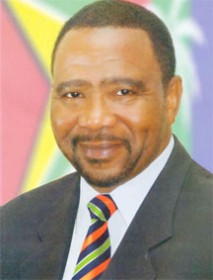Opposition leader Robert Corbin yesterday said he is not interested in contesting the 2011 general elections as the presidential candidate for an opposition alliance or for the PNCR.

He also announced that the PNCR is committed to develop, “without precondition,” a working understanding with any individual or entity, even from within the PPP, willing to negotiate in good faith on a platform to transform the country.
Asked during a press conference if he would be willing to put himself up as the candidate for an alliance if a suitable candidate is not found in time for the elections, Corbin said he was not interested. “I thought that was made very clear, that your humble servant, in whatever arrangement, is not up for any such post, whether the PNCR [will be] going alone to the elections or whether we’re going in a coalition. So that is not up for discussion,” he stated.
Corbin, the PNCR leader, said that it should not be too difficult a task for an opposition coalition to identify a consensus candidate to be president, after they would have agreed on a specific programme to take the country forward. “Whoever is identified will be working within a framework of an agreed objective,” Corbin said.
While the party is committed to taking a leading role in pushing this alliance, Corbin said the PNCR will not play a domineering role and will not insist that a PNCR member be the presidential candidate for the group. “We do not believe that the issue of presidency is one which should detain us. What is more important is the issue of the programme and what we want to achieve,” he stated.
Questioned about the perception held by some that the greatest threat to an opposition alliance is a PNCR party led by Robert Corbin, the PNCR leader rejected these assertions. “I can’t see the PNC as represented by its membership and those who have been elected by its membership being ignored in any such process if we are serious. So I don’t understand the line of argument….,” he said.
Referring to a recent letter published in the newspaper letter pages where someone was advocating the absence of the PNC from a coalition because of its baggage, Corbin suggested that such a position was without merit. “Let us be frank about this. Whatever may be people’s views, the fact is that the PNC commanded the support of more than 40 percent of the electorate for some years and in the last elections still commanded 38%…the second largest bloc of support that turned out to vote…,” he said.“And even if you are to take the [CADRES] poll, which has been disputed by some, you cannot ignore that reality. So it will be naïve for anyone to think that they can just ignore a large body of people that are represented in the Parliament…which in my opinion will be tantamount to disrespecting a large body of the electorate in this country,” Corbin opined.
At the party’s General Council meeting in March, Corbin announced that he would not be its presidential candidate for the next election. He subsequently told reporters that the issue of who would be the PNCR’s presidential candidate was “overblown” since the party was looking to forge a wide platform and develop a programme and personnel which would be able to take the country forward.
Yesterday, Corbin said that the party “welcomes the public debate and discussions” on alliances, coalitions and shared governance, particularly after the news of a possible alliance of opposition parties became the subject of extensive media coverage. He said that this was an agenda being pushed by his party for several years now. He noted that previously various obstacles had presented themselves, but he noted that these have reduced, resulting in a more favourable environment.
He also said the PNCR recognises that while its desires to change the system of governance, it could not adopt a dogmatic position. “We must of necessity be prepared to meet with all stakeholders around the table and fashion a mutually agreeable national programme that addresses the concerns of all, albeit we have already made public our programme for development and modernisation of Guyana in our manifesto,” he said. He added that the PNCR’s Central Executive Committee has recently reaffirmed a previous decision to develop a working understanding with any political party, organisation, or members or groups even from within the PPP, who are willing to negotiate in good faith on the details of a platform for the transformation of the country without precondition. “An alliance or coalition must be set out, in clear and unmistakable terms,” Corbin said, as he pointed to the need for “a realistic platform which defines how we will reform the way Guyana is governed to make our political landscape more inclusive…and responsive to the needs of all sections and groupings of Guyanese.” According to him, this platform “must result in a government that is as broad based as possible and that is flexible enough to bring on board all ideas, all realistic proposals, all patriotic elements and all who are willing to work for a better Guyana.” Corbin said in these discussions, it is paramount that a time frame be given to address constitutional reform which would include the nature of the current executive presidency that is currently in operation.





